七年级英语知识点苏教版.doc
- 格式:doc
- 大小:25.50 KB
- 文档页数:3
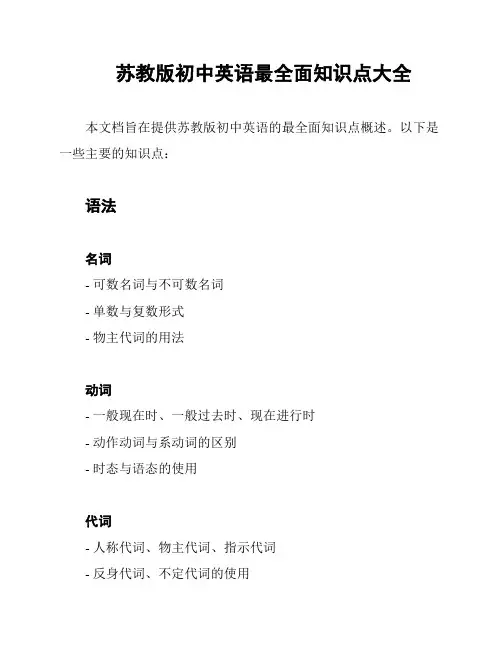
苏教版初中英语最全面知识点大全
本文档旨在提供苏教版初中英语的最全面知识点概述。
以下是一些主要的知识点:
语法
名词
- 可数名词与不可数名词
- 单数与复数形式
- 物主代词的用法
动词
- 一般现在时、一般过去时、现在进行时
- 动作动词与系动词的区别
- 时态与语态的使用
代词
- 人称代词、物主代词、指示代词
- 反身代词、不定代词的使用
形容词与副词
- 形容词的比较级和最高级形式
- 副词的用法和位置
冠词与介词
- 冠词的用法和区别
- 常用介词的意义与使用
从句与复合句
- 定语从句、主语从句、宾语从句
- 状语从句、名词性从句的用法
词汇
基础词汇
- 常见词汇分类与使用
- 常用动词、名词、形容词、副词的研究高频词汇
- 英语中常用的高频词汇总结
- 研究高频词汇的方法和技巧
阅读理解
阅读技巧
- 阅读理解题的解题思路
- 如何快速有效地阅读和理解文章
阅读题型
- 判断正误题、选择题、填空题、简答题等题型- 针对不同题型的解题方法和技巧
口语表达
日常表达
- 询问和回答个人信息、时间、地点等
- 礼貌用语和常用口语短语
交际技巧
- 听懂对话内容并能适时回应
- 用正确的语气和语速进行口语交流
以上是一些常见的知识点概述,希望对您学习苏教版初中英语有所帮助。
如需深入学习和了解,请参考教材和相关学习资料。
祝您学习愉快!。
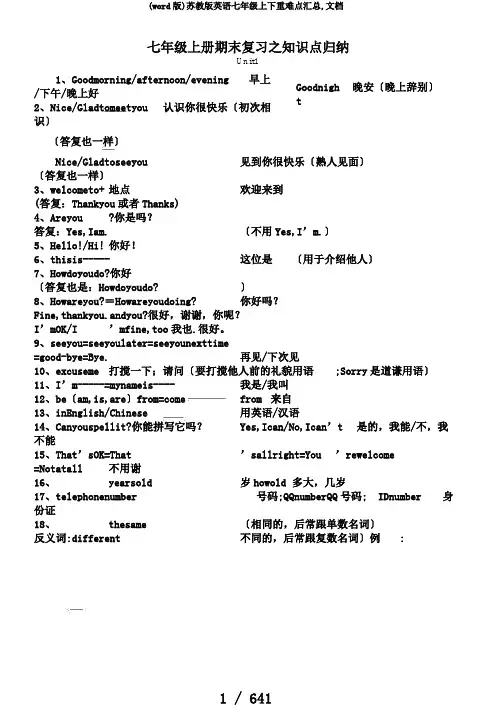
七年级上册期末复习之知识点归纳Unit11、Goodmorning/afternoon/evening 早上/下午/晚上好2、Nice/Gladtomeetyou 认识你很快乐〔初次相识〕Goodnight晚安〔晚上辞别〕〔答复也一样〕Nice/Gladtoseeyou 见到你很快乐〔熟人见面〕〔答复也一样〕3、welcometo+ 地点欢迎来到(答复:Thankyou或者Thanks)4、Areyou ?你是吗?答复:Yes,Iam. 〔不用Yes,I’m.〕5、Hello!/Hi! 你好!6、thisis----- 这位是〔用于介绍他人〕7、Howdoyoudo?你好〔答复也是:Howdoyoudo? 〕8、Howareyou?=Howareyoudoing? 你好吗?Fine,thankyou.andyou?很好,谢谢,你呢?I’mOK/I’mfine,too我也.很好。
9、seeyou=seeyoulater=seeyounexttime=good-bye=Bye. 再见/下次见10、excuseme 打搅一下;请问〔要打搅他人前的礼貌用语;Sorry是道谦用语〕11、I’m-----=mynameis---- 我是/我叫12、be〔am,is,are〕from=come from 来自13、inEnglish/Chinese 用英语/汉语14、Canyouspellit?你能拼写它吗?Yes,Ican/No,Ican’t是的,我能/不,我不能15、That’sOK=That’sallright=You’rewelcome=Notatall 不用谢16、yearsold 岁howold 多大,几岁17、telephonenumber 号码;QQnumberQQ号码; IDnumber 身份证18、thesame 〔相同的,后常跟单数名词〕反义词:different 不同的,后常跟复数名词〕例:Weareinthesamegrade,butweareindifferentclasses.isyourtelephone number? 你的号码是多少?〔注意:疑问词用what,而不能用many/howmuch〕〔答复:Mytelephonenumberis----或者It’-------s〕20.whatclassareyouin ?你是在几班?howIaminClassFive.(注意:Class和Five要大写〕Whatgradeareyouin ?你是在几年级?IaminGradeSeven.〔注意:Glass和Seven要大写〕注意大小写和顺序:七①年级②4③班:④Class Four,GradeSeven④③②①21.What’sthis/that(inEnglish)?〔答复:It’sa/an+单数名词.这是什么?这是〕What’rethese/those(inEnglish)?这些是什么?〔答复:They’re+复数名词. 这些是〕22.Howdoyouspellit? 你怎么拼写它?E-R-A-S-E-R,eraser.Unit21、描述长相:某人+has/have+(an/a)+形容词+五官某人的五官is/are+形容词例:Lilyhasasmallnose.=Lily ’snoseissmall.Ihavebignose.=Mynoseisbig.2、Iknow=Isee我明白了3、That’sright=You'reright那是对的,你说的对。
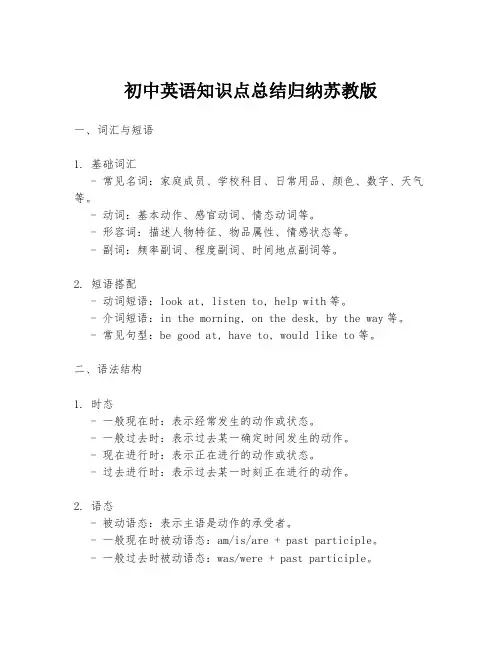
初中英语知识点总结归纳苏教版一、词汇与短语1. 基础词汇- 常见名词:家庭成员、学校科目、日常用品、颜色、数字、天气等。
- 动词:基本动作、感官动词、情态动词等。
- 形容词:描述人物特征、物品属性、情感状态等。
- 副词:频率副词、程度副词、时间地点副词等。
2. 短语搭配- 动词短语:look at, listen to, help with等。
- 介词短语:in the morning, on the desk, by the way等。
- 常见句型:be good at, have to, would like to等。
二、语法结构1. 时态- 一般现在时:表示经常发生的动作或状态。
- 一般过去时:表示过去某一确定时间发生的动作。
- 现在进行时:表示正在进行的动作或状态。
- 过去进行时:表示过去某一时刻正在进行的动作。
2. 语态- 被动语态:表示主语是动作的承受者。
- 一般现在时被动语态:am/is/are + past participle。
- 一般过去时被动语态:was/were + past participle。
3. 非谓语动词- 动名词:作为名词使用,表示动作,如swimming, reading。
- 分词:现在分词和过去分词,用作形容词或副词。
- 动词不定式:to + base form of verb,用作主语、宾语、表语等。
4. 代词- 人称代词:主格和宾格。
- 物主代词:形容词性物主代词和名词性物主代词。
- 反身代词、指示代词、疑问代词等。
5. 介词- 表示时间、地点、方向、原因、方式等。
- 常见介词:at, in, on, for, with, by, to, from等。
6. 连词- 并列连词:and, but, or, so等,连接并列句。
- 从属连词:because, since, although, if, when等,引导从句。
7. 句子结构- 简单句:一个主语和一个谓语构成的句子。
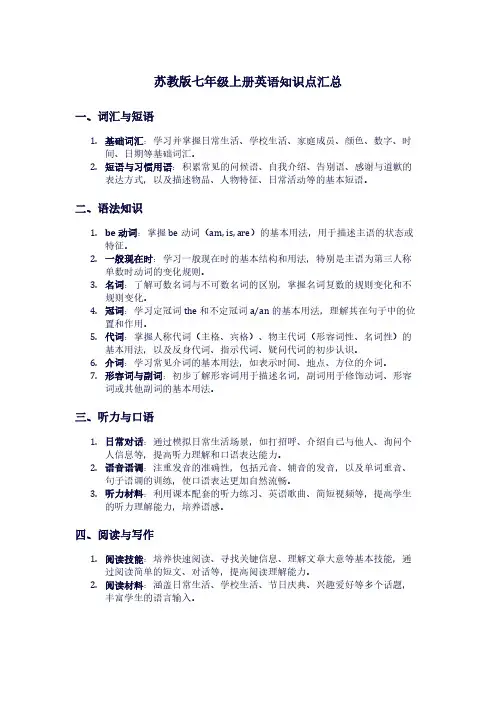
苏教版七年级上册英语知识点汇总一、词汇与短语1.基础词汇:学习并掌握日常生活、学校生活、家庭成员、颜色、数字、时间、日期等基础词汇。
2.短语与习惯用语:积累常见的问候语、自我介绍、告别语、感谢与道歉的表达方式,以及描述物品、人物特征、日常活动等的基本短语。
二、语法知识1.be动词:掌握be动词(am, is, are)的基本用法,用于描述主语的状态或特征。
2.一般现在时:学习一般现在时的基本结构和用法,特别是主语为第三人称单数时动词的变化规则。
3.名词:了解可数名词与不可数名词的区别,掌握名词复数的规则变化和不规则变化。
4.冠词:学习定冠词the和不定冠词a/an的基本用法,理解其在句子中的位置和作用。
5.代词:掌握人称代词(主格、宾格)、物主代词(形容词性、名词性)的基本用法,以及反身代词、指示代词、疑问代词的初步认识。
6.介词:学习常见介词的基本用法,如表示时间、地点、方位的介词。
7.形容词与副词:初步了解形容词用于描述名词,副词用于修饰动词、形容词或其他副词的基本用法。
三、听力与口语1.日常对话:通过模拟日常生活场景,如打招呼、介绍自己与他人、询问个人信息等,提高听力理解和口语表达能力。
2.语音语调:注重发音的准确性,包括元音、辅音的发音,以及单词重音、句子语调的训练,使口语表达更加自然流畅。
3.听力材料:利用课本配套的听力练习、英语歌曲、简短视频等,提高学生的听力理解能力,培养语感。
四、阅读与写作1.阅读技能:培养快速阅读、寻找关键信息、理解文章大意等基本技能,通过阅读简单的短文、对话等,提高阅读理解能力。
2.阅读材料:涵盖日常生活、学校生活、节日庆典、兴趣爱好等多个话题,丰富学生的语言输入。
3.写作技巧:学习基本的写作格式和技巧,如书写规范、标点符号的使用、简单句和并列句的写作等。
通过仿写、改写等练习,逐步提高学生的写作能力。
4.创意写作:鼓励学生发挥想象力,进行简单的创意写作,如编写小故事、描述图片内容等,培养学生的写作兴趣和创造力。
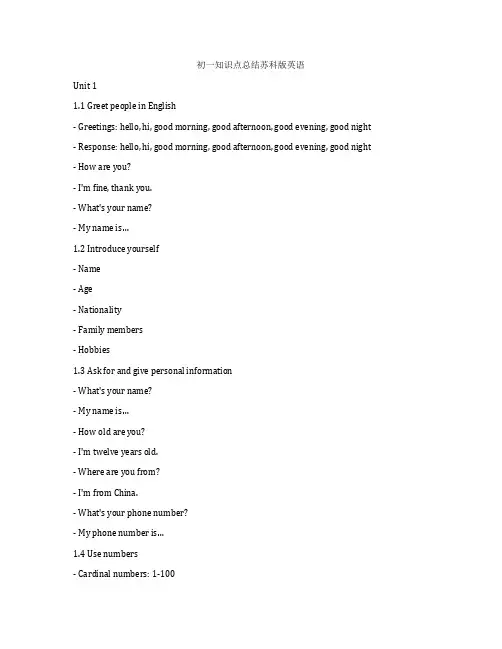
初一知识点总结苏科版英语Unit 11.1 Greet people in English- Greetings: hello, hi, good morning, good afternoon, good evening, good night - Response: hello, hi, good morning, good afternoon, good evening, good night - How are you?- I'm fine, thank you.- What's your name?- My name is…1.2 Introduce yourself- Name- Age- Nationality- Family members- Hobbies1.3 Ask for and give personal information- What's your name?- My name is…- How old are you?- I'm twelve years old.- Where are you from?- I'm from China.- What's your phone number?- My phone number is…1.4 Use numbers- Cardinal numbers: 1-100- Ordinal numbers: first, second, third, etc.1.5 Talk about family- Family members: father, mother, brother, sister, grandparents- Describe family members: tall, short, thin, fat, old, youngUnit 22.1 Talk about school- Subjects: Chinese, Math, English, Science, History, Geography, Art, Music, PE - School facilities: classroom, library, playground, canteen, gymnasium- School supplies: pen, pencil, eraser, ruler, notebook2.2 Give opinions and reasons- How do you like…?- I like…because…- What's your favorite subject?- My favorite subject is…2.3 Ask for and give directions- Where is the library?- It's next to the playground.- How can I get to the gymnasium?- Go straight, then turn right.2.4 Use prepositions of place- In, on, under, behind, in front of, next to, between2.5 Use imperative sentences- Sit down.- Open your book.Unit 33.1 Talk about daily routines- Get up, have breakfast, go to school, have lunch, do homework, have dinner, go to bed - Adverbs of frequency: always, usually, often, sometimes, seldom, never3.2 Talk about free time activities- Play soccer, watch TV, read books, listen to music, play computer games, go shopping 3.3 Talk about hobbies- Sing, dance, draw, paint, play chess, play the guitar, play the piano3.4 Talk about time- Telling time: What time is it?- It's four o'clock.- What time do you get up?- I get up at seven o'clock.3.5 Express likes and dislikes- I like…because…- I don't like…because…- I prefer…to…Unit 44.1 Talk about food and drinks- Rice, noodles, bread, milk, juice, tea, coffee, water- Express likes and dislikes: I like…/ I don't like…4.2 Order food and drinks- What would you like to drink?- I'd like some orange juice, please.- Can I have a bowl of noodles, please?4.3 Talk about quantity- How much rice do you want?- I want a kilo of rice.- How many apples do you want?- I want six apples.4.4 Use countable and uncountable nouns- Countable nouns: apple, banana, orange- Uncountable nouns: rice, bread, milk4.5 Use quantifiers- Some, any, a little, a few, a lot ofUnit 55.1 Talk about the weather- It's sunny, rainy, cloudy, windy, snowy- What's the weather like today?- It's sunny.5.2 Describe clothing- T-shirt, shirt, dress, pants, jeans, coat, hat, shoes - What are you wearing today?- I'm wearing a T-shirt and jeans.5.3 Talk about seasons- Spring, summer, autumn, winter- What's your favorite season?- My favorite season is…5.4 Give reasons- Why do you like spring?- Because it's warm and beautiful.- Why don't you like summer?- Because it's hot and humid.5.5 Use adjectives to describe- Beautiful, ugly, big, small, tall, short, long, shortUnit 66.1 Talk about animals- Lion, tiger, elephant, giraffe, panda, monkey, bird, fish- What's your favorite animal?- My favorite animal is…6.2 Talk about places- Zoo, park, farm, forest, sea, beach, river, mountain- Have you ever been to the zoo?- Yes, I have. / No, I haven't.6.3 Describe people- Tall, short, fat, thin, old, young, kind, friendly, funny- What does he/she look like?- He/She is tall and thin.6.4 Talk about actions- Jump, run, swim, fly, climb, walk, crawl, sing, dance, draw, paint6.5 Use present continuous tense- I am jumping.- The monkey is climbing the tree.Unit 77.1 Talk about family activities- Have meals together, go for a walk, watch TV, play games, go on a trip- What do you usually do with your family?- We usually…7.2 Talk about chores- Sweep the floor, do the dishes, make the bed, take out the trash, clean the windows- What chores do you do at home?- I sweep the floor and make the bed.7.3 Talk about festivals and celebrations- Spring Festival, Mid-Autumn Festival, Christmas, Thanksgiving- What do people do on Spring Festival?- They visit relatives and friends.7.4 Talk about customs and traditions- Have a big meal, give red envelopes, watch lion dances, set off fireworks - What's the customs for Mid-Autumn Festival?- People eat mooncakes and enjoy the full moon.7.5 Use simple past tense- I went to the zoo last Sunday.- They had a big party last night.Unit 88.1 Talk about jobs- Doctor, teacher, engineer, musician, chef, pilot, police officer, firefighter - What do you want to be in the future?- I want to be a…8.2 Talk about places of work- Hospital, school, office, restaurant, airport, police station, fire station- Where does a doctor work?- A doctor works in a hospital.8.3 Talk about professions and duties- A doctor takes care of sick people.- A teacher teaches students.8.4 Talk about abilities- Can you play the guitar?- Yes, I can.- Can he swim?- No, he can't.8.5 Use can/ can't and don't have to/ mustn't- You can play computer games.- You can't eat in the library.- You don't have to wear uniforms to school.- You mustn't smoke in public places.Unit 99.1 Talk about the environment- Plant trees, save water, pick up trash, turn off lights, use public transportation - How can we protect the environment?- We can…9.2 Express opinions- I think we should recycle paper.- I don't think we should waste water.9.3 Talk about nature- Tree, flower, grass, river, mountain, lake, ocean- Have you ever been to the ocean?- Yes, I have. / No, I haven't.9.4 Talk about pollution- Air pollution, water pollution, noise pollution- What causes air pollution?- Factories and cars cause air pollution.9.5 Use imperative sentences- Turn off the lights when you leave the room.- Don't throw trash into the river.Unit 1010.1 Talk about food from different countries- Chinese food, American food, Italian food, Japanese food, Indian food- What's your favorite Chinese food?- My favorite Chinese food is dumplings.10.2 Talk about festivals in different countries- Spring Festival in China, Thanksgiving in the USA, Christmas in the UK, Diwali in India, Hanami in Japan- What do people do on Christmas in the UK?- They exchange gifts and have a big meal.10.3 Learn about different cultures- Language, customs, traditions, clothing, food, music, dance- What's the official language of China?- Mandarin is the official language.10.4 Talk about travel- Airplane, train, bus, car, bike, ship- Have you ever been to the Great Wall?- Yes, I have. / No, I haven't.10.5 Use past continuous tense- I was doing my homework when my friends came to my house.- They were dancing when the music suddenly stopped.以上是初一英语知识点总结,包括了常用的日常用语、基本句型、时态、数量词、介词等各个方面的内容。
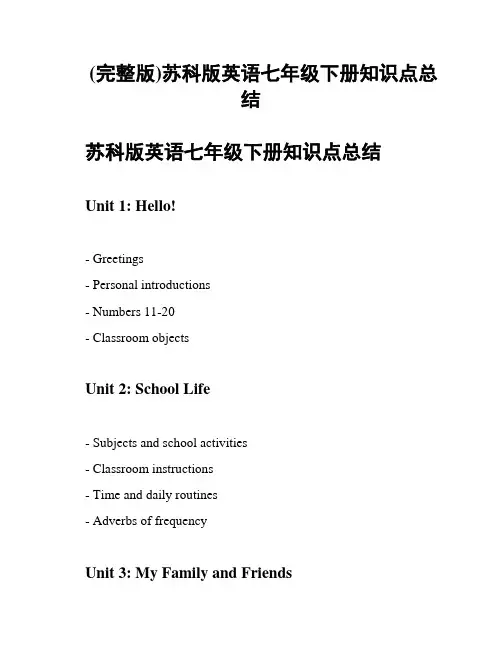
(完整版)苏科版英语七年级下册知识点总结苏科版英语七年级下册知识点总结Unit 1: Hello!- Greetings- Personal introductions- Numbers 11-20- Classroom objectsUnit 2: School Life- Subjects and school activities- Classroom instructions- Time and daily routines- Adverbs of frequencyUnit 3: My Family and Friends- Family members- Describing people's appearance and personality - Possessive adjectives- Present continuous tenseUnit 4: Let's Celebrate!- Festivals and celebrations- Customs and traditions- Food and drinks- ImperativesUnit 5: Shopping Madness- Shopping vocabulary- Money and prices- Simple present tenseUnit 6: Out and About- Places in the town- Giving directions- Transportation- Prepositions of placeUnit 7: Health and Fitness- Parts of the body- Describing illness and symptoms- Giving advice- Modal verbs (should, should not, can, cannot) Unit 8: Nature and Environment- Animals and plants- Weather and seasons- Nature conservation- Present continuous tense (future arrangements)Unit 9: Food and Lifestyle- Food and drinks- Healthy/unhealthy habits- Expressing preferences- Can/Can't for abilityUnit 10: Around the World- Countries and nationalities- Travel and tourism- Cultural differences- Past simple tenseUnit 11: Hobbies and Interests- Free time activities- Sports and hobbies- Expressing likes and dislikes- Present continuous tense (future plans)- Expressing opinions- Forming questions- Reported speech以上是苏科版英语七年级下册的知识点总结,每个单元涵盖了相关的话题和语法知识。
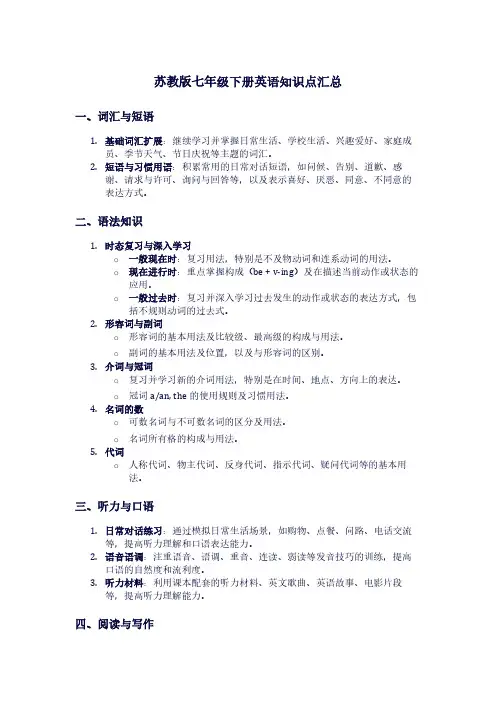
苏教版七年级下册英语知识点汇总一、词汇与短语1.基础词汇扩展:继续学习并掌握日常生活、学校生活、兴趣爱好、家庭成员、季节天气、节日庆祝等主题的词汇。
2.短语与习惯用语:积累常用的日常对话短语,如问候、告别、道歉、感谢、请求与许可、询问与回答等,以及表示喜好、厌恶、同意、不同意的表达方式。
二、语法知识1.时态复习与深入学习o一般现在时:复习用法,特别是不及物动词和连系动词的用法。
o现在进行时:重点掌握构成(be + v-ing)及在描述当前动作或状态的应用。
o一般过去时:复习并深入学习过去发生的动作或状态的表达方式,包括不规则动词的过去式。
2.形容词与副词o形容词的基本用法及比较级、最高级的构成与用法。
o副词的基本用法及位置,以及与形容词的区别。
3.介词与冠词o复习并学习新的介词用法,特别是在时间、地点、方向上的表达。
o冠词a/an, the的使用规则及习惯用法。
4.名词的数o可数名词与不可数名词的区分及用法。
o名词所有格的构成与用法。
5.代词o人称代词、物主代词、反身代词、指示代词、疑问代词等的基本用法。
三、听力与口语1.日常对话练习:通过模拟日常生活场景,如购物、点餐、问路、电话交流等,提高听力理解和口语表达能力。
2.语音语调:注重语音、语调、重音、连读、弱读等发音技巧的训练,提高口语的自然度和流利度。
3.听力材料:利用课本配套的听力材料、英文歌曲、英语故事、电影片段等,提高听力理解能力。
四、阅读与写作1.阅读技能:培养快速阅读、细节理解、主旨大意把握、推理判断等阅读技能。
2.阅读材料:涉及多种体裁,如记叙文、说明文、议论文、广告、电子邮件等,丰富阅读体验。
3.写作技巧:学习书信、日记、便条、通知、电子邮件等常见文体的写作格式和技巧。
4.创意写作:鼓励学生进行创意写作,如编写小故事、描述图片内容、表达个人观点等,培养写作兴趣和自信心。
五、跨文化交际1.了解西方文化:通过学习英语国家的节日、习俗、礼仪、文化标志等,增进对西方文化的了解和尊重。
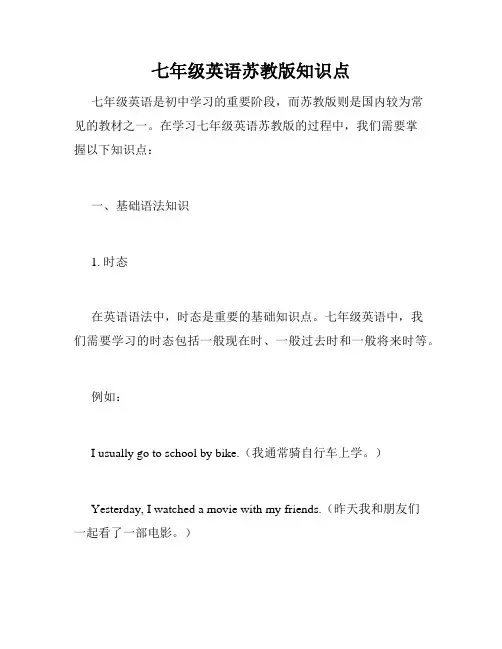
七年级英语苏教版知识点七年级英语是初中学习的重要阶段,而苏教版则是国内较为常见的教材之一。
在学习七年级英语苏教版的过程中,我们需要掌握以下知识点:一、基础语法知识1. 时态在英语语法中,时态是重要的基础知识点。
七年级英语中,我们需要学习的时态包括一般现在时、一般过去时和一般将来时等。
例如:I usually go to school by bike.(我通常骑自行车上学。
)Yesterday, I watched a movie with my friends.(昨天我和朋友们一起看了一部电影。
)I will visit my grandparents next weekend.(下个周末我会去拜访我的祖父母。
)2. 词性词性也是七年级英语的基础知识点之一。
我们需要学习名词(包括可数名词和不可数名词)、代词、动词、形容词、副词等词性,并了解它们的基本用法。
例如:Noun(名词):book(书)、desk(书桌)、water(水)Pronoun(代词):I(我)、he(他)、she(她)Verb(动词):go(去)、eat(吃)、play(玩)Adjective(形容词):big(大的)、red(红的)、happy(高兴的)Adverb(副词):slowly(缓慢地)、quietly(安静地)、happily(快乐地)二、日常口语学习英语不仅要掌握基础语法知识,还要了解基本的日常口语表达。
在七年级英语苏教版中,我们需要学习如何用英语进行问候、介绍、问路等基本日常场景。
例如:Greeting(问候):Hi! How are you?(你好!你怎么样?)Introducing(介绍):This is my friend, Mike.(这是我的朋友迈克。
)Asking for directions(问路):Excuse me, where is the nearest post office?(请问,最近的邮局在哪里?)三、阅读技巧阅读对于学习英语是非常重要的,通过阅读我们可以掌握知识并提高语感。
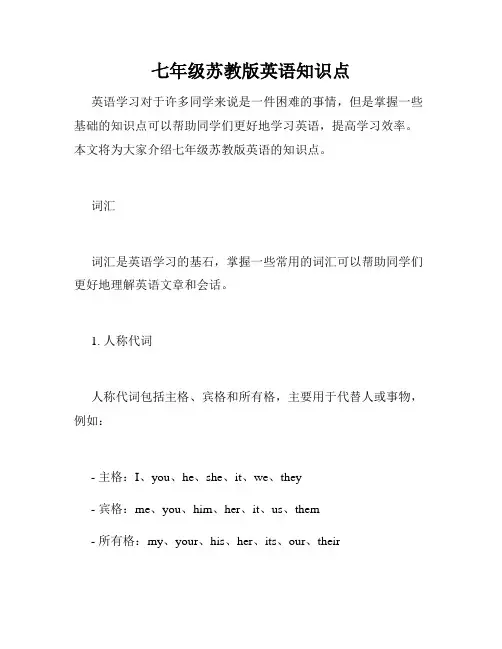
七年级苏教版英语知识点英语学习对于许多同学来说是一件困难的事情,但是掌握一些基础的知识点可以帮助同学们更好地学习英语,提高学习效率。
本文将为大家介绍七年级苏教版英语的知识点。
词汇词汇是英语学习的基石,掌握一些常用的词汇可以帮助同学们更好地理解英语文章和会话。
1. 人称代词人称代词包括主格、宾格和所有格,主要用于代替人或事物,例如:- 主格:I、you、he、she、it、we、they- 宾格:me、you、him、her、it、us、them- 所有格:my、your、his、her、its、our、their2. 数词数词包括基数词和序数词,基数词用于表示数量,序数词用于表示顺序,例如:- 基数词:one、two、three、four、five、six、seven、eight、nine、ten- 序数词:first、second、third、fourth、fifth、sixth、seventh、eighth、ninth、tenth3. 时间词时间词用于表示时间和日期,例如:- 星期:Monday、Tuesday、Wednesday、Thursday、Friday、Saturday、Sunday- 月份:January、February、March、April、May、June、July、August、September、October、November、December- 时间:morning、afternoon、evening、night语法语法是英语学习中的难点之一,正确的语法可以帮助同学们更好地理解英语句子和文章。
1. 句型英语句子有许多不同的句型,常见的包括:- 主语+谓语:He is a teacher.- 主语+谓语+宾语:She reads a book.- 主语+连系动词+表语:The apple is red.- 主语+谓语+间接宾语+直接宾语:She gave me a gift.- 主语+谓语+宾语+宾语补足语:I saw him asleep.2. 时态英语有许多时态,常见的包括:- 现在时:I play football.- 过去时:He watched TV last night.- 将来时:She will go to Beijing next month.- 现在进行时:They are reading books.- 过去进行时:He was listening to music when I called him.3. 助动词助动词用于构成各种时态和语气,常见的助动词包括:- be动词:am、is、are、was、were- 情态动词:can、could、may、might、will、would、shall、should、must阅读阅读是英语学习中的重要部分,通过阅读可以扩展词汇量和提高理解能力。
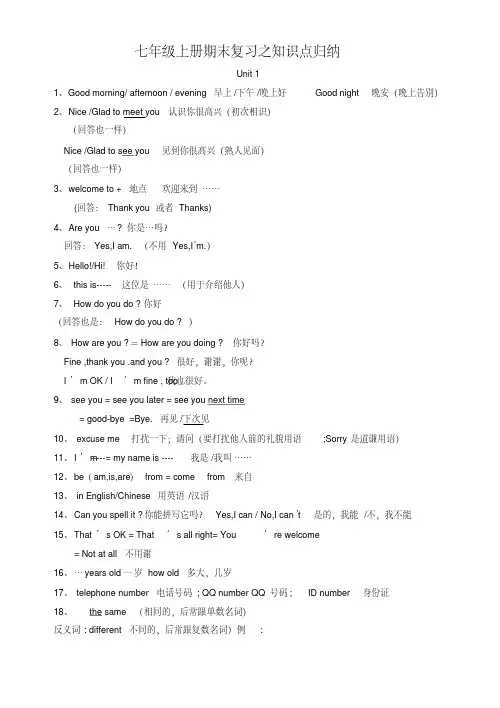
七年级上册期末复习之知识点归纳Unit 11、Good morning/ afternoon / evening 早上/下午/晚上好Good night 晚安(晚上告别)2、Nice /Glad to meet you 认识你很高兴(初次相识)(回答也一样)Nice /Glad to see you 见到你很高兴(熟人见面)(回答也一样)3、welcome to + 地点欢迎来到…… (回答:Thank you 或者Thanks)4、Are you…? 你是…吗?回答:Yes,I am.(不用Yes,I’m.)5、Hello!/Hi! 你好!6、 this is----- 这位是…… (用于介绍他人)7、 How do you do ?你好(回答也是:How do you do ? )8、 How are you ?=How are you doing ? 你好吗?Fine ,thank you .and you ? 很好,谢谢,你呢?我也很好。
I’m OK / I’m fine , too .9、 see you = see you later = see you next time= good-bye =Bye. 再见/下次见10、 excuse me 打扰一下;请问(要打扰他人前的礼貌用语;Sorry是道谦用语)11、I’m -----= my name is ---- 我是/我叫……12、be(am,is,are)from = come from 来自13、 in English/Chinese 用英语/汉语14、Can you spell it ?你能拼写它吗?Yes,I can / No,I can’t 是的,我能/不,我不能15、That’s OK = That’s all right= You’re welcome= Not at all 不用谢16、…years old…岁how old 多大,几岁17、 telephone number 电话号码; QQ number QQ号码; ID number 身份证18、the same (相同的,后常跟单数名词)反义词: different 不同的,后常跟复数名词)例:We are in the same grade, but we are in different classes. 19.What is your telephone number? 你的电话号码是多少?(注意:疑问词用what,而不能用how many/how much )(回答:My telephone number is----或者It ’s -------)20. what class are you in ? 你是在几班?I am in Class Five. (注意:Class 和Five 要大写)What grade are you in? 你是在几年级?I am in Grade Seven.(注意:Glass 和Seven 要大写)注意大小写和顺序:七年级 4 班:Class Four, Grade Seven21. What ’s this/ that (in English) ?这是什么?(回答:It ’s a/an + 单数名词.这是……)What ’re these/ those (in English) ? 这些是什么?(回答:They ’re + 复数名词. 这些是……)22. How do you spell it? 你怎么拼写它?E-R-A-S-E-R, eraser.Unit 21、描述长相:某人+ has/ have +( an /a ) +形容词+五官= 某人的五官is / are + 形容词例:Lily has a small nose. = Lily’s nose is small.I have big nose.=My nose is big. 2、I know = I see 我明白了3、That ’s right =You're right 那是对的,你说的对。
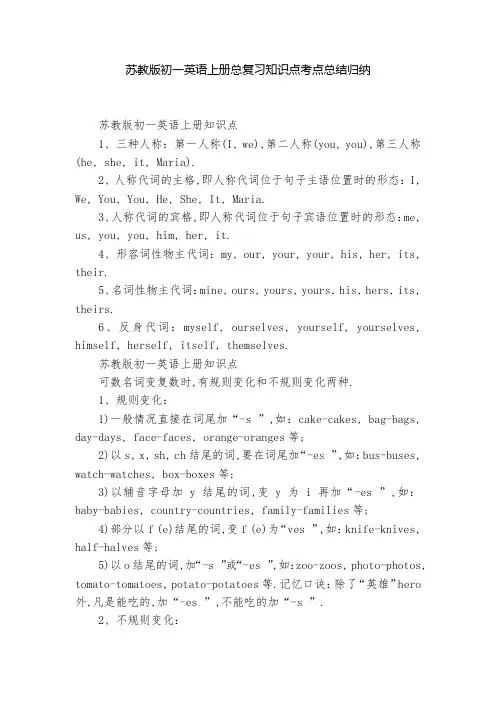
苏教版初一英语上册总复习知识点考点总结归纳苏教版初一英语上册知识点1、三种人称:第一人称(I, we),第二人称(you, you),第三人称(he, she, it, Maria).2、人称代词的主格,即人称代词位于句子主语位置时的形态:I, We, You, You, He, She, It, Maria.3、人称代词的宾格,即人称代词位于句子宾语位置时的形态:me, us, you, you, him, her, it.4、形容词性物主代词:my, our, your, your, his, her, its, their.5、名词性物主代词:mine, ours, yours, yours, his, hers, its, theirs.6、反身代词:myself, ourselves, yourself, yourselves, himself, herself, itself, themselves.苏教版初一英语上册知识点可数名词变复数时,有规则变化和不规则变化两种.1、规则变化:1)一般情况直接在词尾加“-s ”,如:cake-cakes, bag-bags, day-days, face-faces, orange-oranges等;2)以s, x, sh, ch结尾的词,要在词尾加“-es ”,如:bus-buses, watch-watches, box-boxes等;3)以辅音字母加y结尾的词,变y为i再加“-es ”,如:baby-babies, country-countries, family-families等;4)部分以f (e)结尾的词,变f (e)为“ves ”,如:knife-knives, half-halves等;5)以o结尾的词,加“-s ”或“-es ”,如:zoo-zoos, photo-photos, tomato-tomatoes, potato-potatoes等.记忆口诀:除了“英雄”hero 外,凡是能吃的,加“-es ”,不能吃的加“-s ”.2、不规则变化:1)改变单数名词中的元音字母:man-men, woman-women, foot-feet, tooth-teeth等;2)单、复同形:sheep-sheep, Chinese-Chinese, Japanese-Japanese等;3)其他形式:mouse-mice, child-children等.苏教版初一英语上册知识点最基本构成:主语+谓语+宾语,其中谓语由动词来充当.主谓一致原则,就是句子的谓语要始终与主语保持数量上的一致性.当主语是第三人称单数(简称“三单”)时,谓语动词也要相应变成单数形式;当主语非“三单”时,谓语动词就用原形.实意动词变“三单”的规则如下:1)一般动词在词尾加“-s ”,如:like-likes, tell-tells, play-plays等;2)以字母s, x,ch, sh结尾的动词加“-es ”,如:guess-guesses, teach-teaches, watch-watches等;3)以o结尾的动词一般加“-es ”,如:do-does, go-goes等;4)以辅音字母加y结尾的动词,先变y为i,再加“-而是”,如:fly-flies, carry-carries等;5)have的三单形式是has.。
初中英语七年级上册英语(苏教版)知识点
总汇【新】
这份文档是关于初中英语七年级上册英语(苏教版)的知识点总汇。
以下是该册教材中的主要知识点:
单元一:Hello!
研究问候语和自我介绍
研究简单的日常用语和表达方式
研究数字和时间的表达
单元二:What's this in English?
研究常见的物品名称及其英文表达
研究数字的读法和运用
单元三:Where's my backpack?
研究描述物品位置的表达方式
研究使用介词in。
on。
under等描述物品位置单元四:Is this your pencil?
研究询问和回答所属关系
研究询问物品所有者和表达自己的所有权
单元五:How much are these pants?
研究询问物品价格
研究描述物品价格的表达方式
单元六:Do you have any apples?
研究询问和回答物品的存在与否
研究使用some和any来表达数量
单元七:___.
研究询问和回答家庭成员及其关系
研究描述家庭成员的外貌特征和个性
单元八:What time do you go to school?
研究询问和回答日常活动时间
研究使用一般现在时表达日常活动
以上是初中英语七年级上册英语(苏教版)的主要知识点总汇。
该文档可作为复习和备课时的参考资料。
七年级下册苏教版英语知识点1. 语法知识点- 简单现在时:主语+动词原形+s/es- 一般过去时:主语+动词过去式- 将来时:主语+will/shall+动词原形- 形容词:用于描述事物的特征或属性,一般放在名词前面- 副词:用于修饰动词、形容词、其他副词等,一般放在所修饰的词之后2. 词汇知识点- 数字:cardinal number(1, 2, 3...)、ordinal number(first, second, third...)、fraction(⅓, ½...)、percentage(25%, 50%...)- 衣服:clothes、T-shirt、sweater、jacket、pants、skirt、dress、shoes、hat、cap、socks- 饮食:fruit、vegetable、meat、rice、noodles、egg、milk、water、coffee、tea- 家庭:father、mother、brother、sister、grandfather、grandmother、uncle、aunt、cousin、son、daughter3. 句型知识点- 疑问句的构成:将助动词、情态动词或be动词提到主语前面,然后加上主语,其他部分不变。
如:Is he a teacher? Does she like ice cream? Can you play basketball?- 否定句的构成:在助动词、情态动词或be动词后面加not,其他部分不变。
如:She is not a doctor. He doesn't like football. They can't swim.- 祈使句的构成:直接用动词原形,如:Sit down. Don't run. Study hard.4. 阅读技巧- 预测:通读文章,根据标题、首段、段落标志词等进行预测;- 细读:重点阅读每句话、每个段落,理解每个单词和句子的含义;- 反复阅读:通过多次阅读加深理解,特别是难以理解的地方。
苏教版初一英语知识点学习是快乐的,学习是幸福的,虽然在学习的道路上我们会遇到许多困难,但是只要努力解决这些困难后,你将会感觉到无比的轻松与快乐,下面是小编为大家精心整理的苏教版初一英语知识点,希望对大家有所帮助。
this,that和it用法(1)this和that是指示代词,it是人称代词。
(2)距离说话人近的人或物用this,距离说话人远的人或物用that。
如:This is a flower. 这是一朵花。
(近处)That is a tree. 那是一棵树。
(远处)(3)放在一起的两样东西,先说this,后说that。
如:This is a pen. That is a pencil. 这是一支钢笔。
那是一支铅笔。
(4)向别人介绍某人时说This is…,不说That is…。
如:This is Helen. Helen, this is Tom. 这是海伦。
海伦,这是汤姆。
(5)This is 不能缩写,而That is可以缩写。
如:This is a bike. That’s a car. 这是一辆自行车。
那是一辆轿车。
(6)打电话时,介绍自己用this,询问对方用that。
如:—Hello! Is that Miss Green? 喂,是格林小姐吗?—Yes,this is. Who’s that? 是的,我是,你是谁?注意:虽然汉语中使用“我”和“你”,但英语中打电话时绝不可以说:I am…,Are you…?/Who are you?(7)在回答this或that作主语的疑问句时,要用it代替this或that。
如:①—Is this a notebook? 这是笔记本吗?—Yes, it is. 是的,它是。
②—What’s that? 那是什么?—It’s a kite. 是只风筝。
these和those用法this, that, these和those是指示代词,these是this的复数形式,指时间、距离较近的或下面要提到的人或事;those是that的复数形式,指时间、距离较远或前面已经提到过的人或事物。
苏教版七年级英语复习知识点的您准了教版七年英复知点的文章,希望您有帮助!1.pen pal笔友2.speak English英3. be from=come from来自4.on weekends 在周末5.write to do某人写信5.live in居住7.a little一些8.likes and dislikes喜 / 不喜9.like doing sth喜做某事10.like to do sth想去做某事11. tell sb about sth告某人对于某事12.tell sb to do sth告某人去做某事13. talk to/with sth 1和某人4.talk of /about sth某事15. be interesting in⋯⋯感趣16.go to the movies=go to the cinema =go to see a film去看影17.hear from sb收到某人来信Unit 2 Where’s the post office?一.语言目标:问路,指路问路的常用句型:Excuse me :1.Where’s the post office?2.Is there a post office near here?3.Which is the way to the post office?4.Could you tell me how to get to the post office?5.Could you tell me how can I get to the post office?6.Could you tell me where the post office?(特别疑问句跟在宾语从句后,其语句用用陈说句语序)二.Is there a bank near here?There be句型:表示某地有某物,表示客观存在。
否认形式只要在there be + notEg: There isn’t any water in the cap.疑问句: Be + there +其余Eg: Is there a zoo near hear?have/has:表示某人有某物附属关系Eg: We have a bed in the room?假如后接门牌号,用介词atEg: He lives at 88 Hua Xing street.在街道上, in the street英国人用法,on the street美国人用法。
七年级英语知识点苏教版
为大家整理的七年级英语知识点苏教版的文章,供大家学习参考!更多最新信息请点击初一考试网
词汇
1.中学阶段常见科目
Chinese语文 P.E.体育art美术 science科学 music音乐 math 数学
history历史 biology生物 physics物理 chemistry化学
2.“favorite+名词”表示“最喜欢的……”
favorite city最喜欢的城市favorite food最喜欢的食物favorite color最喜欢的颜色favorite TV show最喜欢的电视秀favorite sport最喜欢的运动favorite subject最喜欢的科目
3.on Monday在星期一
4.“have+学科名词”表示“上……课” have math上数学课have science上科学课
5.my music teacher我的音乐老师
6.my last class我的最后一节课
7.be tired是疲劳的(相当于feel tired) 8.after lunch午饭后 after class下课后9.play + 球类名词10. play with sth.和某物玩耍 play with my dog和我的狗一起玩耍句式1.询问某人最喜欢的物品的句型
—What’s your favorite subject?
—My favorite subject is science
2.询问原因的句型及答语—Why do you like P.E.?
—Because it’s fun.
3.询问某人的句型及答语
—Who is your science teacher?—My science teacher is Mr Wang.
4.主系表结构——sb.+be动词+形容词I’m really busy!
5. 主系表结构——sth.+be动词+形容词
It’s difficult,but interesting.Music is relaxing.
6.and连接的并列句Our teacher is very strict and I’m usually very tired after.
句型:What’s your favorite subject?
My favorite subject is math.
What’s his favorite subject?
His favorite subject is art.
What’s her favorite subject?
Her favorite subject is P.E.
What subject do you like best? I like math best.
Why do you like math? Because it’s interesting.
Why does he like art? Because it’s fun.
Who is your art teacher? Our art teacher is Mrs. Jones. I’m really busy doing my homework.
She is busy with her work.
I have science. It’s too difficult.
I’m really tired of watching TV
I like to play with my dog.
He is always running around with me.
结构:1, favorite=like…best 最喜爱……
2, be busy doing sth 忙于做某事 be busy with sth 忙于某事 3, be tired of doing sth 做……感到厌烦。